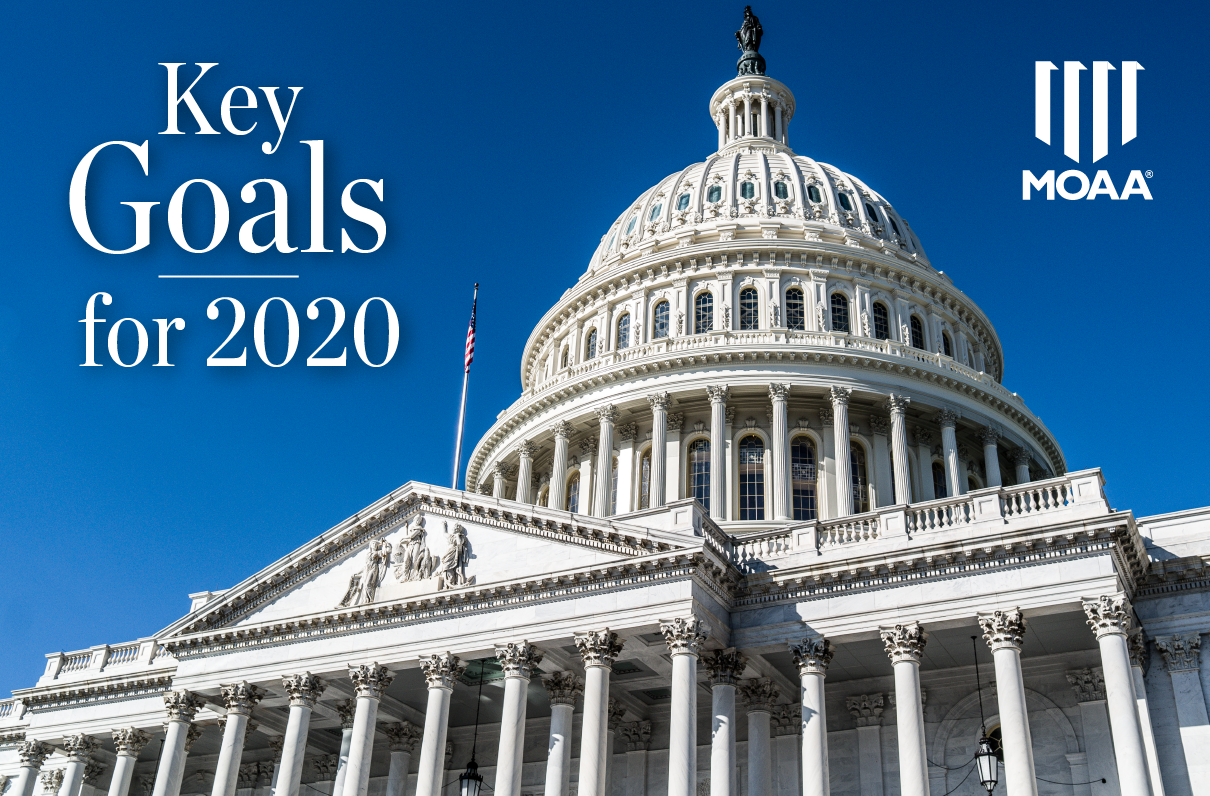(A version of this article originally appeared in the January 2020 issue of Military Officer, a magazine available to all MOAA Premium and Life members. Learn more about the magazine here; learn more about joining MOAA here.)
This will be a tumultuous news year of partisan politics, with the focus on the upcoming presidential election as well as the 33 Senate seats and 435 seats in the House of Representatives up for election.
MOAA will continue to remain decidedly nonpartisan. Our team works with every elected official, seeking positive change for the members of the seven uniformed services, our nation’s veterans, and all military families and survivors.
In January, the 116th Congress begins its second session, and MOAA continues to stay focused on our mission. We’ve spent the past year meeting with members of Congress and their staffs to discuss pay equity, military medicine, survivor benefits, and other issues affecting servicemembers and veterans and their families. With record-level support during the first session on issues like repealing the “widows tax,” it’s clear our lawmakers know MOAA will remain equally engaged during the second half.
MOAA’s Government Relations staff identified the following objectives, which broadly represent priorities with targeted actions (not all inclusive) to address anticipated threats for the coming year. As we continue the fight to sustain benefits, health care, and compensation in support of the uniformed services and their families, we will keep our members informed on progress throughout the year.
“Our team has analyzed issues of benefits and compensation common to servicemembers and veterans and their families and survivors. We plan to clearly communicate specific actions we will undertake this coming year to address concerns across these expansive topics,” said Col. Dan Merry, USAF (Ret), vice president for Government Relations. “Please be sure to sign up for The MOAA Newsletter online for updates.”
[RELATED: Visit MOAA's Legislative Action Center]
Protect Your Health Care Benefit
Objective: Ensure any changes to the Military Health System sustain military-medical readiness and beneficiary access to top-quality care.
Overview: Access to quality health care is paramount for servicemembers and retirees and their families. MOAA continues to target our advocacy efforts at preserving a strong military medical system and keeping TRICARE effective and affordable for all beneficiaries who earned and rely on these health care benefits.
In recent years, servicemembers and retirees have carried the increased burden of paying more for their health care than most people think. The notion that these beneficiaries pay little to nothing for health care provides the fuel to raise TRICARE fees and copayments for lawmakers and administration officials to fund military readiness or other programs not directly related to health care or medical readiness.
[RELATED: Surgeons General Lay Out How Many Health Care Jobs Each Service May Lose in Merger]
The government should be doing more to stabilize and improve the TRICARE program and the Military Health System (MHS), rather than disproportionately shifting readiness costs to beneficiaries or enacting cuts to medical billets and health and research programs that provide essential operational support.
Actions:
- Prevent disproportional TRICARE fee increases
- Stand down efforts to cut military medical billets and efforts to dismantle the MHS
- Stop cuts to the Uniformed Services University of the Health Sciences, which provides education to uniformed health professionals, scientists, and leaders
Keep Military Pay and Benefits Strong
Objective: Sustain military pay comparability with the private sector and block erosion of compensation and non-pay quality-of-life benefits.
Overview: To support an all-volunteer force (AVF) essential to a strong national defense, our government must consistently provide our servicemembers with compensation commensurate with their service and sacrifice. Failing to do so has significantly eroded military pay and allowances, and adversely affected recruiting and retention. A steady and benchmarked military pay raise, tied to the Employment Cost Index (ECI) as called for in law, is the more stable approach to ensuring our troops are adequately compensated. Our uniformed services are in a war for talent in a diminishing recruiting pool, and maintaining pay, allowances, and improving quality-of-life programs and benefits are critical to national security.
[RELATED: Rising Costs, Dwindling Recruit Numbers, Increasing Demands May Bring Back the Military Draft]
Actions:
- Ensure pay raises match the annual ECI index increase
- Protect housing allowances from programmatic changes that penalize military-to-military married couples and those with children
- Improve Defense Finance and Accounting Service quality and timeliness of support, and reduce existing backlog in services
- Protect commissary and exchange benefits and dividends which support military quality- of-life programs
- Approve flexible spending accounts for servicemembers in line with civilian employer programs
Support Military Families
Objective: Protect family support programs, and ensure military-provided services (housing, PCS, child care) are affordable, readily available, and meet quality standards.
Overview: Programs and services for military and veteran families are often the first to see cuts to staffing, quality, and availability when government funding becomes tight. These benefits are essential to ensure servicemembers are squared away and can focus on the mission. Additionally, military spouses play a vital role in a servicemember’s decision to stay in the military. When DoD prioritizes people first, it can retain a mission ready all-volunteer force.
Actions:
- Improve comprehensive housing reform and accountability
- Improve accountability of contract movers and claims during PCS moves
- Create incentives to increase quality child care provider accessibility and capacity options
- Include military spouses as a target group for the Work Opportunity Tax Credit and improve occupational licensure transitions
- Preserve Parole in Place and improve paths to citizenship for servicemembers and families
Concurrent Receipt for All Retirees
Objective: End concurrent receipt penalties for military retirees.
Overview: Since 2004, Concurrent Retirement and Disability Payments authorized the concurrent receipt of retirement pay and disability pay for those who retired with a rating over 50% by the VA. Unfortunately, those who retired with less than a 50% rating from the VA and those who did not reach the 20-year mark and were medically retired under Chapter 61 do not receive the compensation they deserve. Incremental improvements to concurrent receipt that include Chapter 61 retirees and those retired with a 40% rating is the next step to extending concurrent receipt to military retirees.
[RELATED: Understanding Concurrent Receipt]
Actions:
- Approve concurrent receipt for Chapter 61 retirees
- Approve concurrent receipt for service-connected disabled retirees rated 40% and below
Support the Total Force
Objective: Achieve equity of benefits, protections, and administrative support for Guard/Reserve members consistent with their active duty counterparts.
Overview: National Guard and Reserve troops are an essential part of America’s national defense strategy. Over the past two decades, they have been used in an operational capacity, constantly serving on domestic and international missions to help protect our country. Despite conducting the same duties as their active duty counterparts, they are not receiving the same credit for their active time. To support our servicemembers in reserve components, changes must be made to reflect the total force mentality.
[RELATED: Report Outlines Steps to Help National Guard and Reserve Families]
Actions:
- Eliminate Guard/Reserve retirement pay processing delays
- Ensure timely health care benefit for Guard/Reserve retirees
- Expand Military Lending Act protections and support
- Expand GI Bill parity for their service
Better, Faster DoD/VA Services
Objective: Ensure timely access to service-earned benefits, and resist proposals to erode foundational services delivered through the VA and DoD.
Overview: MOAA believes in promoting national recognition and understanding of military service and how health care and benefits are earned through service in uniform, which are qualitatively different from “entitlement” or “social welfare” programs. While we recognize the fiscal pressures Congress is under, MOAA considers it our obligation as a leadership organization to do what is right for veterans and their families, and to do all we can to make them as whole as possible as they live out their lives once they take off the uniform. As such, we oppose decisions that erode foundational services and benefits delivered through the VA and DoD or decisions that degrade health care and benefits.
The honor, dignity, and respect of a veteran at the time of their burial is an essential component to these benefits, so resources should be provided to meet the demand of those seeking burials at cemeteries across the nation.
[Related: Arlington FAQs: What You Need to Know About Proposed Changes to Burial Eligibility]
Actions:
- Enhance suicide prevention programs and access to behavioral health care
- Assure appropriate health care and benefits for service-connected exposures
- Strengthen and preserve support services for servicewomen and women veterans
- Improve wounded warrior and caregiver programs
- Implement the VA MISSION Act and identify legislative improvements
- Preserve earned military-veteran burial benefits
Strengthen and Support All Uniformed Services
Objective: Support legislation, policies, and programs to enable the seven uniformed services to recruit, retain, and manage personnel.
Overview: During a 35-day government shutdown in January 2019, servicemembers of the Coast Guard, Public Health Service, and NOAA worked without pay. To sustain all services’ ability to perform missions critical to national security, lapses in appropriations or budget concerns should not affect earned compensation and benefits. Additionally, federal statutes that support the armed forces’ ability to grow and maintain their force should apply equally across the uniformed services, depending on mission needs.
The morale, welfare, and readiness of servicemembers are negatively affected by incidents of sexual harassment and assault. To foster a culture of trust with servicemembers, there must not only be confidence in the chain of command that it is safe to report a sexual assault or incident of harassment, but also the assurance that servicemembers see immediate administrative and legal justice.
Actions:
- Sustain continuous and timely appropriations for whole of government
- Ensure the continuity of pay and benefits during lapses in appropriations
- Ensure authorizations and appropriations for the Coast Guard, Public Health Service, and NOAA Corps to meet expanding mission needs.
- Ensure implementation of sexual harassment and assault reporting programs through expanded protection of the safe to report program, and strengthen deterrence measures for sexual harassment prevention through command administrative actions for substantiated sexual harassment investigations
Why Should You Join MOAA?
The more voices we have, the better we'll be heard. Become a member today.
Protect Military Survivors
Objective: End financial penalties for military survivors.
Overview: Recognizing the sacrifices survivors have endured, Congress must improve and protect existing survivor benefits issued by DoD and the Veterans Administration (VA) and to eliminate benefit inequities.
Actions:
- Increase Dependency and Indemnity Compensation


